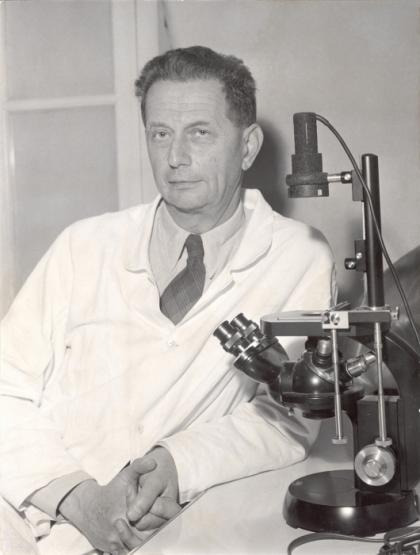 THE UNIQUENESS OF LIVING BEINGS
THE UNIQUENESS OF LIVING BEINGS

During the 1930s, André Lwoff worked in top-ranking foreign laboratories including in Heidelberg, Germany. With his wife and close colleague Marguerite, he received a grant from the Rockefeller Foundation to work with Otto Meyerhof, 1922 Nobel Prize in Physiology or Medicine. Here André Lwoff showed how different growth factors could stimulate bacterial metabolism.
He was the first to discover that small molecules, coenzymes, can function as vitamins essential for cell growth. Some microorganisms such as colibacillus synthesize them, whereas for others external sources are necessary. André Lwoff thus defined the status and role of growth factors. Subsequent biochemical analysis gave rise to the concept of uniqueness of structure and functioning in the living world. His work was recognized as fundamental by the international scientific community
VIRULENT OR SILENT BACTERIOPHAGES
Following in the footsteps of Eugene and Elisabeth Wollman, André Lwoff's research focused on lysogenic bacteria. These bacteria multiply indefinitely perpetuating the genome of a bacteriophage (specific bacterial virus) incorporated into their own genome.
Various factors upset this balance and the bacteriophage develops resulting in bacterial death (lysis) and the release of infectious bacteriophages.
This process can be triggered at will in the entire lysogenic bacteria population under the influence of certain factors such as ultraviolet radiation. André Lwoff gave the name "prophage" to the form in which the genome of the bacteriophage is perpetuated in lysogenic bacteria. The bacteriophages produced by these bacteria, known as temperate bacteriophages, can therefore follow one of two pathways when they infect sensitive bacteria.
Either, like virulent bacteriophages, they multiply in the bacteria which lyse releasing infectious bacteriophages.
Or their genome is incorporated into the bacteria that they perpetuate in non-infectious form, the prophage.
Extract of André Lwoff’s Nobel Prize speech
December 10, 1965
"It is research that has led me here and research, we all know, is a game… And as research is a game, in theory at least it matters little whether we win or lose. But scholars have one thing in common with children. They like to win and they also like to be rewarded…
When a baby is baptized we don’t ask its opinion. What is the point? When the Foundation awards its prize it does so without the recipient’s prior agreement. It is assumed that they will accept it. It may happen that the award is declined due to pressure from others or perhaps personal pressure.
But why refuse the sacrament when refusal is sure to be refused? If I mentioned the word sacrament, this is because scientific research is a religion that requires faith, rational faith. Like any religion, it requires prophets, a council of apostles, and the soul and heart of an entire people.
It also requires martyrs… The victim derives obvious pleasure from the ceremony and there are a lot of candidates for martyrdom, as all scholars yearn for recognition deep down. However, the fame bestowed on the laureate with a distinction so rare, so coveted, and so dazzling, somewhat randomly sets them apart from their peers, forces them to consider and judge themselves. It also forces them to consider prizes in general, the generosity of fate, the charms and disadvantages of fame…
And now all of a sudden an event beyond my control takes a place in my life that it would be vain to deny the importance of and which, further, is a happy event. Happy for my country, for the institution to which I belong, and for the discipline I work in. Happy also for my family and friends and last of all doubtless for myself…"
© The Nobel Foundation 1965


